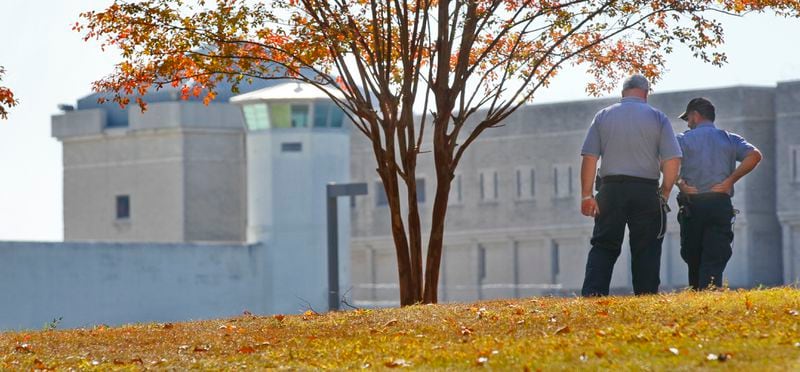A Stone Mountain mother of three and her inmate fiancé have been charged with running a shuttle service for inmates who temporarily leave the minimum-security prison camp adjacent to the U.S. Penitentiary in Atlanta so they can visit restaurants, hotels and homes.
According to a criminal complaint filed Friday, Kelly Bass and Deldrick Jackson were using a telephone app to get payment from federal prisoners who used their services.
“Ms. Bass has been going to the prison for months and running what can be described as an inmate Uber,” Assistant U.S. Attorney Jeff Davis said, comparing the services Bass and Jackson allegedly offered to the popular ride sharing company.
The criminal complaint charges Jackson with escape and Bass with assisting an escape. There could be more charges brought against both of them when the two are indicted.
Jackson, already serving 10 years and 10 months for conspiracy to distribute cocaine and money laundering, will remain in custody. After a brief hearing before a federal magistrate, Bass — who has children ages 8, 13 and 17 — was released on a $15,000 unsecured bond, which means she only has to put up money if she violates the terms of her release.
The FBI agent’s affidavit attached to the complaint describes a thriving business that resembles accounts of other enterprises inmates have run from the grounds of the U.S. Penitentiary in southeast Atlanta.
Earlier this year, the FBI and Atlanta police arrested inmate Thomas Stinson after he slipped through a hole cut in the fence to fetch a bag containing a cellphone, scissors, nail clippers, two bottles of tequila, two cartons of cigarettes, four boxes of cigars, and various food items, all banned inside the prison.
With his arrest, the public learned of a bizarre yet "sophisticated operation" involving teams of inmates who would leave the prison and return with no fear of being caught. They would reportedly sell to other convicts, at inflated prices, the items they brought back — beer, alcohol, marijuana, cocaine and takeout food from nearby restaurants.
One inmate — who requested anonymity because of fear of retribution from prisoners and guards — told The Atlanta Journal-Constitution there is a party in the living areas almost nightly. Inmates drink, use drugs and barbecue without being caught because there are only a couple of guards supervising 500 inmates spread over eight buildings.
The inmate told the AJC this week that while searches of the living spaces had increased after Stinson's arrest in January, inmates' nightly trips through or over perimeter fences continued. He said prison officials caught two inmates trying to leave a few weeks ago, but they were replaced that same night by others willing to leave the grounds and return with alcohol, drugs and other banned items.
Winifred Hemphill, who is president of South-View cemetery, which abuts the prison property, said she had repeatedly called to report inmates coming onto the sprawling burial grounds to meet women. She said, however, that the flow of inmates to meet cars driving the cemetery grounds seemed to have stopped several months ago.
Initially, Hemphill said, prison officials dismissed her complaints by reminding her that the camp was a minimum security facility. But in recent years they had become “more responsive,” she said.
The Bureau of Prisons did not respond to an emailed request for comment Friday. They have yet to comment on the escapes, which were first reported in February.
Agent James Hosty wrote that Jackson and Bass, who owns a silver Acura SUV, provide “inmates who have escaped with transportation to restaurants, hotels or residences for a fee (often paid via the Square Cash app).”
He said surveillance video footage showed three people running from the camp’s perimeter fence at 10:32 p.m. on Jan. 28 and getting into a silver SUV. A video camera at a nearby hotel captured images of a Silver SUV, with the same license plate as the car that had been outside the prison, pulling into the hotel parking lot and letting out three men at 10:42 p.m. The SUV came back more than three hours later, at 2:04 a.m. on Jan. 29, to pick up the three men. Then at 2:10 a.m. cameras outside the prison fence recorded the three climbing over and running back toward the living quarters.
Hosty wrote that Square Cash records show that from last November until March about $4,000 was transferred from accounts associated with inmates into an account associated with Bass’ debit card.
Bass and Jackson were arrested around 11 p.m. Thursday after Jackson had climbed two fences and then walked out the front gate.
Hosty wrote that Jackson said he escaped Thursday night to “have sex” and had escaped many times before.








